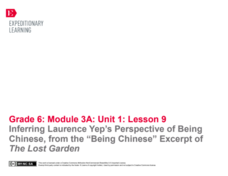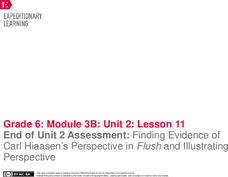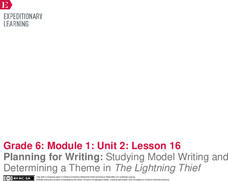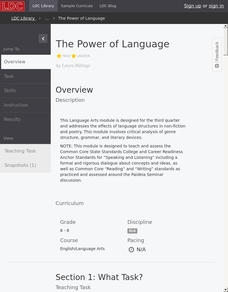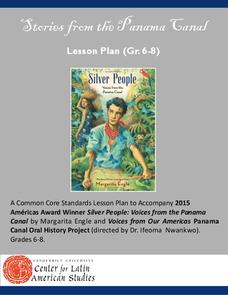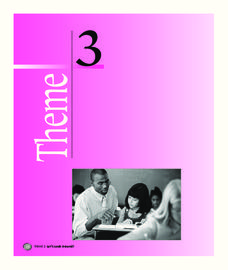Deer Valley Unified School District
Close Reading: Analyzing Mood and Tone
The AP Literature and Composition exam is all about close reading. Test takers are presented with a passage and asked to analyze how an author uses literary devices to create a desired effect. Prepare your students for the exam with a...
Novelinks
Where the Red Fern Grows: Question Answer Response Strategy
What makes a good question? Middle schoolers explore the use of questioning through QAR, the question answer response strategy, while reading Where the Red Fern Grows. They learn about the four types of questions: right there, think and...
Curated OER
Express Yourself Lesson Seed 4
Get started with The Cay. First, provide some background information and images that relate to the novel. Then pupils can create double-entry journals. Once that is complete, read the first two chapters, encouraging individuals to record...
EngageNY
Inferring Laurence Yep’s Perspective of Being Chinese, from the “Being Chinese” Excerpt of The Lost Garden
It's all about perspective! Using the resource, scholars read a third excerpt from Laurence Yep's autobiography, The Lost Garden. As they read, individuals complete graphic organizers using clues from the text to infer the author's...
EngageNY
End of Unit 2 Assessment: Finding Evidence of Carl Hiaasen’s Perspective in Flush and Illustrating Perspective
The end is here. Scholars work independently on End of Unit 2 Assessment: Finding Evidence of Carl Hiaasen’s Perspective in Flush and
Illustrating Perspective. Learners use their graphic organizers and text to write to a prompt asking...
EngageNY
Planning for Writing: Studying Model Writing and Determining a Theme in The Lightning Thief
A theme runs through it. Scholars analyze how a common theme runs through the myths they have read and The Lightning Thief. They complete graphic organizers and view a four paragraph model essay. They analyze the essay for structure and...
Ask a Biologist
It’s a Plankton Eat Plankton World
For as small as they are, plankton sure play an enormous role in maintaining marine ecosystems. Dive into an investigation of these tiny organisms with a hands-on life science activity in which children cut out pictures of sea animals...
Curated OER
Paradise Lost: Bloom’s Taxonomy of Thinking Processes
Chapter II of John Milton's Paradise Lost provides the text for a series of comprehension questions crafted using Bloom's Taxonomy.
EngageNY
Finding Evidence of Laurence Yep’s Perspective of the Police in Dragonwings
Perspective is everything. Using a graphic organizer, pupils determine Laurence Yep's perspective of the police in his novel Dragonwings. Additionally, scholars complete anchor charts to identify connotative language in the text.
EngageNY
Author’s Read: Final Performance Task
Scholars submit their final performance task, a letter to a publisher about an athlete's legacy. As a culminating activity, they share their work with classmates in small groups.
EngageNY
Carl Hiaasen’s Perspective of Florida: Part 2
Look it up. Scholars read Florida: A Paradise of Scandals Excerpt 1 and use a dictionary to look up any unfamiliar words. They then do a close read of the text and answer text-dependent questions. Learners analyze author perspective by...
EngageNY
Mid-Unit Assessment: On-Demand Writing – Conflicting Interpretations of the 13th and 14th Amendments
The authors of the court's decision and the dissenting opinion on Plessy v. Ferguson disagreed on their interpretations of the Thirteenth and Fourteenth Amendments. Scholars set out to show how with an on-demand writing prompt. They...
Literacy Design Collaborative
The Power of Language
There is power in words. Readers take a close look at three text to determine how language structures affect meaning, including include poems and recipes. Scholars analyze the language authors use by circling important words, underlining...
McGraw Hill
Study Guide for Frankenstein
Help the class uncover the story of Frankenstein. Learners answer questions and complete activities to respond to the text Frankenstein as they read. Scholars learn new vocabulary, respond to personal and text-dependent questions,...
EngageNY
Grade 9 ELA Module 1, Unit 1, Lesson 12
Finding the central idea in a text can be as simple as deciphering the correct pieces of supporting evidence. As your class reads Stage 4 of "St. Lucy's Home for Girls Raised by Wolves" by Karen Russell, they analyze the interactions...
Curated OER
Unit Plan for The Catcher in the Rye —A “Place-Based” Approach
"People never notice anything." As part of their study of The Catcher in the Rye, class members adopt Holden Caulfield's approach and spend time as quiet observers of their surrounding, recording their observations/reflections in a...
Vanderbilt University
Stories from the Panama Canal
The stories of the Silver People, the West Indies immigrants hired to work on the Panama Canal, come to life in a lesson about the building of the Panama Canal. Groups research why the canal was built, how it was build, the working...
Trinity University
Explain Yourself: An Expository Writing Unit for High School
Introduce expository writing with a unit that asks writers to craft an essay to explain a belief, value, or priority that is important to them. Mini-lessons within the unit focus on crafting thesis statements and conclusions, selecting...
Houghton Mifflin Harcourt
Let’s Look Around!: Challenge Activities (Theme 3)
Let's Look Around! is the theme of a unit that offers a plethora of challenge activities. Enhance your scholars' learning experiences and reinforce concepts with activities such as writing a book about farm animals, an imaginary place,...
Southern Nevada Regional Professional Development Program
The Columnist Project
Imagine a list that includes Alan Abelson of Baron's, Bob Woodward of the Washington Post, and Mother Jones. High schoolers select a national columnist, read and annotate five columns by this author, noting the rhetorical strategies,...
Curated OER
A High-Interest Novel Helps Struggling Readers Confront Bullying in Schools
Bully, bullied, or bystander? Paul Langan's The Bully is the anchor text in a unit that examines bullying and violence. After a close reading of the text, readers imagine themselves as the characters and consider how they would react in...
West Corporation
Making Inferences – Use Your Mind to Read!
How can you tell if someone is happy? The lesson works with elementary and middle school scholars to activate their schema and pay attention to details to make inferences in their daily lives, poetry, and other literature. Cleverly...
EngageNY
Reading for Gist and Analyzing Point of View: Moon Shadow
Character analysis isn't always earth-shattering. Using a graphic organizer, pupils analyze Moon Shadow's point of view following the earthquake in Laurence Yep's Dragonwings. Also, scholars co-create an anchor chart showing the...
EngageNY
Drafting Introduction and Conclusion
In conclusion ... Scholars analyze the model essay Adversity Faced by Townspeople in
the Middle Ages to gain a better understanding of introductory and concluding paragraphs. After studying the author's strategies, learners begin writing...





